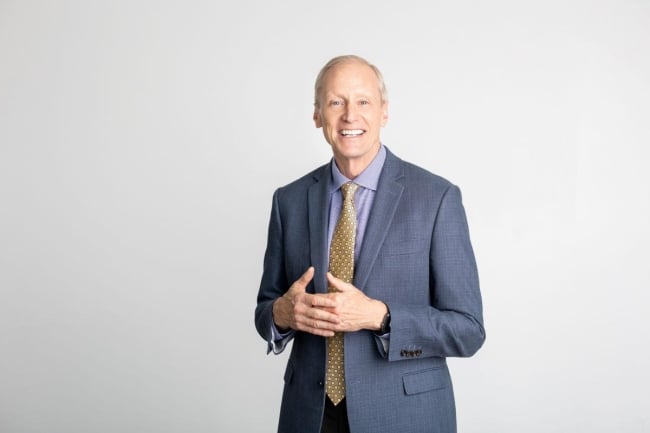You have /5 articles left.
Sign up for a free account or log in.

Doane University president Roger Hughes
Courtesy of Doane University
Roger Hughes has an unusual résumé for a college president.
Before recently taking the helm at Doane University, a private institution in Nebraska, he was the longtime head football coach at Stetson University. He also worked as head football coach at Princeton University for nine years.
"Running a football team and running an organization like a university is very similar," Hughes said. "It's my job as president to outline the vision and articulate the vision so that everyone else knows what their role is to help execute the vision."
Stories of college presidents breaking the mold are becoming more common. The traditional path from dean to provost to president followed by most academics now has more detours, and the people taking them aren't always academics. They're sometimes business executives, civic leaders, former governors and members of Congress, wealthy donors -- and, yes, former football coaches.
The number of college presidents with experience from outside academia has grown during the past decade. A 2018 study from Virginia Commonwealth University revealed that 40.5 percent of college presidents have never held tenured or tenure-track positions. More and more presidents are coming to higher education institutions after spending their careers as businesspeople, military personnel and health-care professionals. That coaches are now part of the mix is unsurprising.
Hughes is not even the first college athletics coach to become a college president, but his selection as president of Doane last month is the story of a personal dream come full circle.
"I've always kind of had this job in the back of my mind," Hughes said. "I had really two dream jobs. One, to be the head coach of Nebraska football. Or two, being the president at Doane University."
He graduated from Doane in 1982 with a double major in biology and physical education and a minor in math. He first applied to be president at the university 10 years ago after leaving his coaching job at Princeton. When he wasn’t selected for the position, he took a job as head football coach at Stetson, a small private university in Florida, where he was asked to build a football program from scratch.
“My job was to literally start from a desk and a phone -- that was all I had the first day -- and to actually build it into a conference contender,” he said.
By the end of his tenure at Stetson, Hughes managed more than 160 direct reports and served as a liaison between the team and many facets of the university, including admissions, financial aid, housing, student success, strength and conditioning, and health services.
“Through that interaction with all the different facets of the university, I became much more familiar with how a university worked,” Hughes said.
He’d also developed a good reputation on campus.
"He wanted us to grow and become good men after football, so he taught me a lot and prepared me for life after football in a major way," Dwight Lawrence, a member of the Stetson football team, recently told the Orlando Sentinel.
The responsibilities of a head coach and a college president aren’t so different, said Jeffrey Harris, managing partner at Harris Search Associates.
“There’s a lot of commonality in terms of function as the CEO of their respective organizations,” Harris said. “In the end, they have to be the person held accountable as the leader of their respective entity.”
Both coaches and presidents are key fundraisers for their institutions and have to be able to sell donors on their vision. Hughes understands this; he raised $18 million for the football program at Princeton.
“While we may be building for an athletic weight room rather than a chemistry lab -- the principles are all the same. We’re helping young people develop their skills to become leaders in the world,” he said.
Hughes's coaching experience has also prepared him to weather criticism from employees, students, parents and others.
“Every time I call a play, probably 50 percent of people are upset with the play I called anyway. I’m used to being criticized for decisions that I’m making,” he said. “I’m sure university presidents go through the same thing, where sometimes there’s no right or wrong answer, but you have to make that decision and go with it.”
This quick decision making is one of the things that will make Hughes an effective president, said Cale Stolle, an assistant professor of physics and engineering at Doane.
Hughes is not the first football coach-turned-college president. Jim Tressel, president of Youngstown State University in Ohio, was head football coach at Youngstown and then Ohio State University before becoming president at Youngstown in 2014.
Tressel took over Youngstown as the university struggled with an $11 million budget deficit. He was endorsed by faculty union leaders when he was hired, but not every faculty member was on board. Chet Cooper, then chairman of the Youngstown State Academic Senate, told Inside Higher Ed in 2014 that “some professors are enthusiastic, some are diametrically opposed” to Tressel’s hire.
Tensions between athletics and academia at higher education institutions are not uncommon, and faculty members are often uneasy about nonacademics taking the helm of their institutions.
“In presidential searches where they’ve hired someone who’s not considered an academic -- and a football coach would fall into that -- the faculty are frequently up in arms on that,” Harris said. “Because they think, how could somebody who’s not an academic run an academic institution?”
There was some concern among Doane faculty about hiring a football coach as president, Stolle said.
“There is always going to be some awkwardness in hiring a football coach,” Stolle said. “It’s much more than just ‘Were you a good football coach?’ It’s ‘Will you have a good direction?’ The thing that was striking about Dr. Hughes was that he was a very natural leader.”
It didn't hurt that Nebraska is an ideal state for a football coach to pursue a college presidency.
"We revere football coaches very highly," Stolle said.
Hughes is not totally without experience in academia. He has a Ph.D. in exercise physiology from the University of Nebraska at Lincoln and had planned to become a tenure-track professor. An interview for a tenure-track position at the University of Chicago ultimately changed his mind.
“When I talked with the department chair, I asked him how many hours he got to spend with students,” Hughes said. “He said two hours a week because he was writing and doing research and all those other things. I really felt like I couldn’t have the same kind of influence on students’ lives.”
Hughes values his academic experience because it allows him to understand decision-making processes and timelines that a college president must regularly navigate.
"I think what people are understanding now is that the leadership quality is crucial -- you know, you're still leading an organization. I'm not going to be teaching many classes. I'm probably not going to be writing a whole lot" of grant applications or articles, Hughes said.
Hughes has so far enjoyed his first couple of months as president and is excited about improving the student experience at Doane.
“Leadership is leadership,” Hughes said. “If you're a good leader, you can lead an army battalion or a food bank or a hospital or, in this case, a university.”








